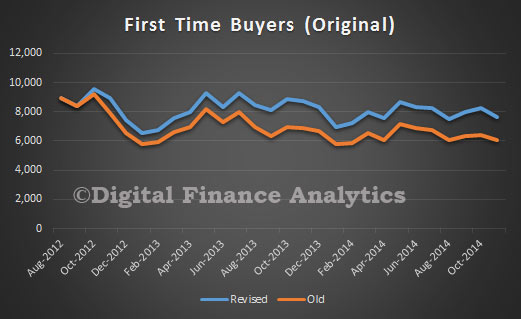The ABS published revised First Time Buyer data to try and iron out some data issues. As a result in November 2014 an extra 1,566 loans (25.8%) were found. This means First Time Buyer Loans were 14.6% of new loans in November, as opposed to 11.6% reported previously. Still a low number, compared with the peak of 30.6% in April 2009.
 This does not count First Time Buyers going direct to the investment sector, which we have highlighted before. The ABS explanation follows.
This does not count First Time Buyers going direct to the investment sector, which we have highlighted before. The ABS explanation follows.
The First Home Owner Grant (FHOG), introduced on 1 July 2000, is a national scheme funded and administered by the states and territories http://www.firsthome.gov.au. Under the scheme, a one-off grant is payable to eligible first home owners. Until October 2012, all first home buyers were eligible for the grant regardless of whether they bought a new or an established home.
Gradually, States and Territories restricted grants to new homes only so that first home buyers who were buying established homes were no longer eligible for the grant. APRA reporting instructions state that a First Home Buyer is a borrower entering the home ownership market for the first time as an owner-occupier. The instructions do not make any distinction between first home buyers who are eligible for a First Home Owner Grant and those who are not. Nonetheless, some lenders’ reporting systems only record first home buyers if they are eligible for a grant which may cause under-reporting of first home buyers.
This under-reporting has progressively impacted on first home buyer statistics from October 2012 as individual States and Territories have changed the eligibility of their First Home Owner Grants, generally to cover only the purchase of newly constructed homes.
States and Territories restricted grants to new homes from different dates – New South Wales and Queensland from October 2012; Victoria from July 2013; the Australian Capital Territory from September 2013; South Australia and Tasmania from July 2014. Loans to first home buyers were therefore underestimated in these States from the dates specified due to some lenders under-reporting. Other lenders have reported correctly throughout. Originally, the drop in loans to first home buyers from October 2012 had been attributed to the change in grant eligibility reducing the affordability for first home buyers and economic conditions, such as rising house prices and the increase in investment loans for housing. However, subsequent analysis and follow-up with lenders has confirmed that the drop was due, at least in part, to under-reporting by some lenders.
CHANGES TO THE ESTIMATION METHOD
The ABS estimates that the number of loans to first home buyers which are currently being reported are approximately 80% of the total number of loans to first home buyers. Total reported monthly home loan commitments are not affected by this under-reporting.
For lenders who are under-reporting loans to first home buyers, the ABS has developed a model to adjust the proportion of first home buyers to total loans for each period of incorrect reporting. The model uses the following components:
a) proportion of first home buyers to total loans for those lenders reporting correctly this period;
b) the proportion of first home buyers to total loans for those lenders reporting incorrectly in the previous period;
c) the proportion of first home buyers to total loans for those lenders reporting correctly in the previous period; and
d) coefficients which determine the relative contribution of the above components to the incorrectly reported proportion.
The coefficients (d) of this model were estimated using data from January 2002 to the month prior to the First Home Owner Grant policy being changed (for example, in NSW the data were from January 2002 to September 2012). All the affected states were analysed separately. When more lenders are able to report correctly, the coefficients and estimates will be updated accordingly.
Application of the adjusted proportion:
The following table is an excerpt from the Housing Finance form (ARF392.0) and will be used to demonstrate the application of the adjusted proportion.
There are no known issues in reporting the total number and value of Fixed rate home loans (9t and 9vt), Secured revolving credit home loans (10t and 10vt) and Other home loans (11t and 11vt). The estimated proportion of first home buyers is applied to the totals for Question 9, Question 10 and Question 11 (9t, 9vt; 10t, 10vt; and 11t, 11vt) respectively to determine the number of first home buyers of the particular loan type. The values for non-first home buyers (i.e. All other loans) are then derived by subtracting the values for first home buyers from the respective totals.
Each lender reports the data by State and Territory, and the proportion for each period is applied to the relevant lenders at the state level. The adjustment is made at the lowest level collected, and is applied to the affected lenders and affected States only. The data are then aggregated to the published States and the national level.
Revisions have been made to the previously published data for the Number, Percentage (%) of all dwellings financed, and Average loan size of First Home Buyers and Non-first home buyers at the national level (columns B to G of Table 560909a). Relevant States’ previously published data have also been revised (Table 560909b) back to when the First Home Owner Grant was first restricted in that State or Territory.

2 thoughts on “First Time Loans Now 25% Higher – ABS”